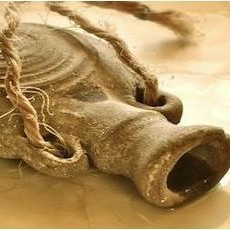Your Deeds Are a Memorial
- Jan 25, 2023
- 5 min read
Everything we say and do is memorialized for good or for evil. If a person or event is memorialized, something is produced that will continue to exist and remind people of them. To memorialize a person is to honor them for how they lived and what they did. This is why we have memorials when a person passes away. We take time to gather and remember them. We almost always talk about them as if they were the best people we ever knew. We bring out the good and bury the bad.
Serial killers or those who commit mass murders leave a memorial behind. They will never be forgotten for their horrendous act. Those who are heroic also leave a legacy of such and are memorialized for their heroism. Everything we do will bear testimony of who we were on the earth.
“I call heaven and earth as witnesses today against you, [that] I have set before you life and death, blessing and cursing; therefore choose life, that both you and your descendants may live; - Deu 30:19 NKJV
There are a couple of other scriptures that state that heaven and earth bear witness to our decisions. When we choose life, we are blessed; when we choose death, we are cursed. People tend not to understand what it means to make such choices. Some think that everyone chooses life because nobody desires death. Little do they know that their choices lead to eternal life or death.
Even those who confess to being born-again believers make choices that can lead to death; at the very least, their choices allow curses to remain in effect. The choice to love God with all our hearts, soul, minds, and strength will always lead to life and blessings.
Jesus memorialized a woman because she poured oil over his head just before the Pharisees came to arrest Him and crucify Him. A leper named Simon is also memorialized. We may not know who Simon the leper is, but all of heaven testifies to his healing.
6 And when Jesus was in Bethany at the house of Simon the leper, 7 a woman came to Him having an alabaster flask of very costly fragrant oil, and she poured it on His head as He sat at the table. – Matt 26:6-7
Jesus’ disciples were angry with this woman for what they considered a waste of resources. Jesus saw her love for Him in her actions, and He said she did good work for Him; then He memorialized her. 12 For in pouring this fragrant oil on My body, she did it for My burial. 13 Assuredly, I say to you, wherever this gospel is preached in the whole world, what this woman has done will also be told as a memorial to her.” - Mat 26:11-13
Wouldn't it be awesome to know that your good deed got you into the hall of Jesus' fame? How many hours or days have you spent “wasting” your precious resource of time in prayer and worship? I doubt any of us have wasted enough time on Jesus, or we would bear the fruit!
There’s a song called Waste it All. Part of the lyrics go like this, “When I’m here at Your feet I can feel You, all the voices fade away I will spend all my days Giving back the love You gave I’m gonna waste it all on You I’m gonna pour my heart’s perfume I don’t care if I’m called a fool I’m wasting it all on You.” - Kim Walker-Smith
Of course, to those who love God, no time spent searching for the Lord is a waste! The eternal rewards of our seeking God are the greatest, and we are also rewarded here. However, people who do not value a relationship with God through Jesus Christ may not understand why you would rather spend your time in worship and prayer. That is what makes you different. A heart that seeks the Lord is a changed heart.
When Moses was called to deliver God’s people from the bondage of Egypt, the first thing they were to do was go into the wilderness and worship Him.
Moses went to Pharaoh and said, “Let My people go, that they may hold a feast to Me in the wilderness.’” - Ex 5:1 When Pharaoh denied the command of God, Moses said, “The God of the Hebrews has met with us. Please, let us go three days’ journey in the desert and sacrifice to the LORD our God, lest He fall upon us with pestilence or with the sword.” - Ex 5:3
The Pharaoh considered the worship of God to be a waste of precious resources, his slaves. He not only denied Moses’ request, but he put a heavier burden on the enslaved people. By having the taskmasters make the people gather the straw on top of making the bricks, they were even more burdened.
Banqueting and feasting were major parts of biblical social and religious life. This feast was meant to honor God. It was Yahweh’s feast and a time to celebrate the One who had promised them a land of freedom, prosperity, and joy.
The place the people were to have this feast was in the wilderness. The wilderness, or the desert, is a place that, for the most part, is uninhabitable and not fit for permanent settlement. The wilderness is barren except for certain seasons, which depend on the former and latter rains. Joel declared, “Don’t be afraid, wild animals, for the wilderness pastures have turned green, the trees bear their fruit, and the fig tree and grapevine yield their riches. - Joel 2:22
These verses describe a time of refreshing while in the desert wilderness. Moses told Pharoah that they wanted to journey to the desert and make sacrifices to God. Remember, the Israelites were enslaved to the Pharoah and had nothing. To go to the desert and make animal sacrifices might sound like they were moving from one bondage to another. We must move forward even if it does not look like it will bear fruit; this is faith.
When we can honor God in all things, times of plenty and times of lack, we can be assured that we have arrived at a genuine place of worship.
To the Pharoah, the people were resources he was unwilling to give up. To God, they were souls that He was going to rescue but not before they entered the wilderness. What should have only been a short journey turned into forty years of wilderness due to the people’s heart conditions. God provided for them in the wilderness; they were never without food, clothing, or covering. Yet, it was not enough, and they longed for what they had left.
God will spend the next forty years of your life working out of you the Egypt He freed you from. The faster you submit to His hand, the quicker your promised land will come!
Let’s pray,
Dearest Father and God, I long to be in the land of plenty with You. I repent for grumbling while on my journey and the heartache it has caused You. Thank You for staying with me, being slow to anger, and patiently calling me into the promised land even as I cause my own wilderness suffering. I surrender. I am ready to cross my Jordan and see what is on the other side. I give You my fears and anxieties about moving from this comfortable land – my own Egypt. I embrace Your destiny for me. In Jesus' name, Amen
Dr. Ernestine Graham






Comments